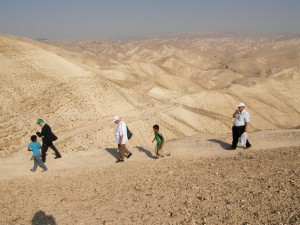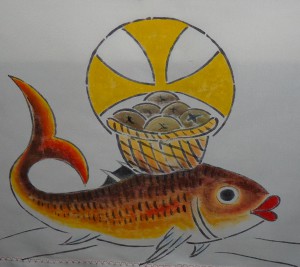A commentary on John 6, 1-15 (XVII Sunday of O.T.: July 26th 2015)

Let us remember that in the Sundays of this liturgical year we are reading the gospel of Mark and that we have reached chapter six. Last Sunday we saw Jesus deeply moved before a crowd of people that were like “sheep with no shepherd”. Today we should go on reading from the same chapter of Mark what is known as “the multiplication of bread”.
But, for this episode, the Liturgy has preferred to offer, for this and the next four Sundays, the reading of John chapter six, that is quite rich in theological references. This Sunday we start off with the first fifteen verses. We can read them personally and try to get its meaning for each one of us today. On my part, I put forward make two points of meditation:
1.- Jesus as the new Moses
John begins his story in quite a solemn way. It’s evident that he means that what he is going to say is very important. There are at least three elements that mark this “solemnity”:
– Jesus from the lake climbs up to the mountain. We all know that the mountain, in biblical language, is much more than just a geographical incident. To go up the mountain reminds us, among other stories, of Moses going up the Sinai, where he had that extraordinary revelation of God as liberator and “chief” of his people.
-When He is on the top of the mountain Jesus “sits down” with his disciples. The gesture speaks of Jesus as the Master with an authority that nobody else ever had. As Moses received on the Sinai Mountain the Law for his people, Jesus teaches on the mountain the new Law, the Word received from the Father.
-The Passover, the feast of the Jews, was near. We know that the Passover, Easter, was the feast in which the memory of the liberation was made, the identity of the people was strengthened and hope was renewed for a new and definitive liberation.
What John is going to tell us in this chapter six of his gospel has to be placed in this solemn set of theological references.
For he disciples, and for us now, Jesus is not an ordinary “rabbi”, nor one of many prophets or somebody who wanted to purify and renew the ethical levels of society… He is the Eternal Word of God that enlightens like a lamp in the night; He is the bread that nourishes us in the dessert of life; He is the new Moses, who, coming down from the mountain, leads the people and sustains it on the way to freedom and full life. He is the centre of the new Passover, the new alliance with the Father for the life of all.
2.- The impossible made possible
John says that Jesus asked Philip how to do to nourish so many people in an isolated place. And Philip gave him the only possible answer: it’s no possible. All of us would have given the same answer, as we really do in front of so many difficulties and problems with no apparent solution.
Philip was right, but it seems that he has forgotten the history of his own people: to nourish a crowd in an isolated place is impossible, as it was impossible that a tiny people could have been liberated from the power of the Pharaoh; or that this same people would be able to cross the dessert and not die on the intent… But the experience of Israel is that God made all this possible, so that indeed it was liberated, it did cross the dessert, and it did reach the Promised Land.
But we should not think that God acted as a kind of “magician”. It is something more simple and deep: When we allow God to go with us and we do our own part, the powerful give way, waters divide themselves, bread is enough, injustice is overcome, conflicts give way to reconciliation and new levels of brotherhood are possible, till the will of God is fulfilled “on earth as it’s on heaven”.
When we confront problems with faith, hope and charity, the impossible becomes possible, as it has happened so many times in universal history and in our own personal life. When we take part in the Eucharist all this is celebrated and made actual.
Fr. Antonio Villarino
Roma




